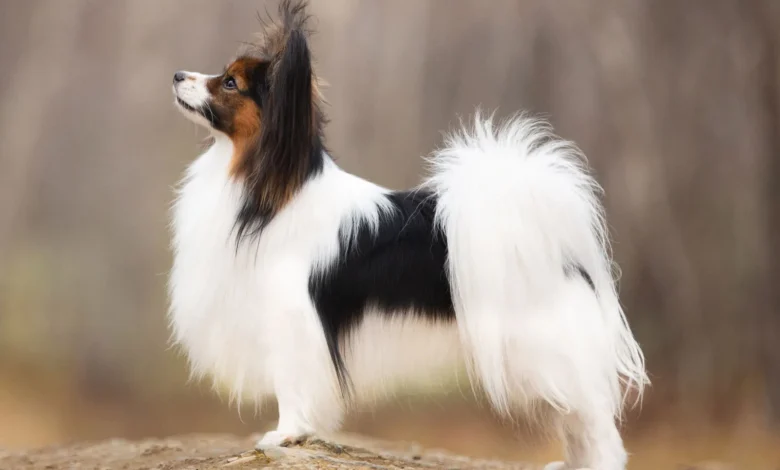Papillon Dog: A Complete Guide to the Charming Butterfly-Eared Breed

The Papillon dog is a delightful little companion known for its intelligence, elegance, and playful nature. With its distinctive butterfly-like ears and small stature, this breed has won the hearts of dog enthusiasts around the world. Beyond its appearance, the Papillon is full of personality, agility, and charm. In this detailed guide, we’ll explore the history, characteristics, care needs, and more to help you understand why the Papillon dog makes such a wonderful pet.
Origins of the Papillon Dog
The history of the Papillon dog dates back several centuries, with roots in Renaissance Europe. The breed’s name, “Papillon,” is French for “butterfly,” referring to its signature large, fringed ears that resemble butterfly wings. This toy breed has appeared in paintings from the 16th and 17th centuries, often alongside nobility, signaling its longstanding status as a favored lap dog.
The Papillon evolved from small spaniels known as “continental toy spaniels.” Over time, breeders refined the Papillon’s features, giving rise to the distinct butterfly-eared look that we recognize today. These dogs were particularly popular with European royalty, including Marie Antoinette, who was said to adore her Papillon named Coco.
Characteristics and Appearance
The Papillon dog is admired for its delicate yet lively appearance. Though small, this breed carries itself with elegance and energy, creating a striking contrast between its size and personality. Here’s what makes the Papillon physically unique:
- Size: Typically, Papillons stand 8 to 11 inches tall at the shoulder and weigh between 5 to 10 pounds.
- Ears: Their butterfly-like ears are fringed with long hair, standing upright and giving them a cheerful look. (There is also a variation called the “Phalene,” where the ears drop down.)
- Coat: Papillons have a long, silky coat that is usually white with patches of black, red, or sable. Their fur is fine but doesn’t tangle easily.
- Eyes: They have large, expressive dark eyes that give them an alert and curious expression.
The Papillon’s graceful structure reflects its heritage as both a companion dog and an active participant in sports like agility.
Personality and Temperament
When it comes to personality, the Papillon dog proves that good things come in small packages. These dogs are known for their spirited, outgoing, and affectionate nature. Papillons bond deeply with their families and thrive on human interaction.
Key Traits of the Papillon Dog’s Temperament:
- Playful and Energetic: Despite their small size, Papillons have high energy levels. They love to play fetch and participate in games.
- Affectionate: Papillons form strong bonds with their owners and enjoy cuddling as much as they do running around the yard.
- Highly Intelligent: This breed is exceptionally smart and easy to train. They respond well to positive reinforcement and can learn commands quickly.
- Social and Friendly: Papillons generally get along well with other pets and are friendly with strangers when properly socialized.
While Papillons are gentle companions, their curious nature and love for activity mean they need regular mental and physical stimulation to stay happy.
Is the Papillon Dog a Good Family Pet?
The Papillon dog can make a fantastic addition to many types of families. However, it’s important to consider their personality and needs to ensure a good fit.
Why the Papillon Dog Fits Well in Many Homes:
- Great for Individuals and Couples: Due to their small size and easygoing nature, Papillons are ideal for singles or couples, especially those living in apartments.
- Older Children and Papillons: Papillons do well with older kids who understand how to handle small dogs. However, they may not be the best fit for households with very young children who could accidentally injure them.
- Companion for Seniors: Their affectionate nature and minimal grooming needs make Papillons a wonderful choice for older adults looking for a companion.
Though small, the Papillon is quite active, so it’s essential to provide regular playtime and exercise to keep them healthy and content.
Exercise and Activity Needs
Don’t let their petite size fool you—Papillons are energetic dogs who love staying active. A simple walk around the block may not be enough to satisfy their high energy levels.
Exercise Tips for Papillon Dogs:
- Daily Walks: Papillons benefit from at least two short walks per day to burn off energy.
- Playtime: These dogs love interactive games, such as fetch or hide-and-seek.
- Agility Training: Papillons excel at dog sports like agility and obedience due to their speed and intelligence.
- Indoor Fun: If you’re stuck inside, puzzle toys and training exercises will keep your Papillon engaged.
Ensuring your Papillon dog stays physically active is important not only for their physical health but also for their mental well-being.
Grooming the Papillon Dog
Though the Papillon has a luxurious coat, it’s surprisingly easy to maintain. Their silky fur is less prone to matting, and they don’t require frequent trips to the groomer.
Grooming Tips:
- Brushing: Brush their coat 2 to 3 times a week to keep it shiny and remove loose hair.
- Bathing: Bathe your Papillon once a month or as needed to keep them smelling fresh.
- Nail Trimming: Trim their nails every few weeks to prevent discomfort.
- Dental Care: Like many small breeds, Papillons are prone to dental issues, so brushing their teeth regularly is essential.
Maintaining a grooming routine will keep your Papillon dog looking and feeling their best.
Health and Lifespan
Papillons are generally healthy dogs with a lifespan of 12 to 16 years. However, like all breeds, they can be prone to certain health conditions.
Common Health Issues in Papillon Dogs:
- Patellar Luxation: A condition where the kneecap slips out of place, common in small breeds.
- Progressive Retinal Atrophy (PRA): A genetic eye disorder that can lead to vision loss.
- Dental Problems: Papillons can suffer from gum disease if their teeth aren’t cared for properly.
Regular vet visits and a healthy diet are key to keeping your Papillon in top shape.
Feeding and Nutrition
A well-balanced diet is crucial for the health and vitality of your Papillon dog. Because they are small dogs, it’s easy for them to gain weight, so portion control is essential.
Feeding Guidelines:
- High-Quality Dog Food: Choose food with quality ingredients and appropriate protein levels.
- Portion Control: Feed small meals twice a day rather than one large meal to avoid overfeeding.
- Treats in Moderation: Papillons love treats, but too many can lead to obesity.
Providing proper nutrition will ensure your Papillon stays energetic and healthy throughout their life.
Table: Quick Facts About the Papillon Dog
TraitDetails
Lifespan 12 to 16 years
Weight 5 to 10 pounds
Height 8 to 11 inches
Coat Type Long, silky, and low-shedding
Exercise Needs Moderate; enjoys daily activity
Grooming Brushing 2-3 times a week
Temperament Friendly, intelligent, playful
Suitable For Apartments, families, seniors
Final Thoughts on the Papillon Dog
The Papillon dog is a delightful blend of beauty, brains, and affection. Whether you’re looking for a playful companion to join in activities or a cuddly lap dog, the Papillon is up for the challenge. Their lively personality and easygoing grooming needs make them an ideal pet for many households.
If you’re thinking about adding a Papillon dog to your family, be prepared for a loyal friend who will bring joy and laughter into your life. With proper care, training, and attention, the Papillon can thrive, making it a beloved member of your household for years to come.
So, what are you waiting for? Bring home a Papillon dog and let the fun begin!

